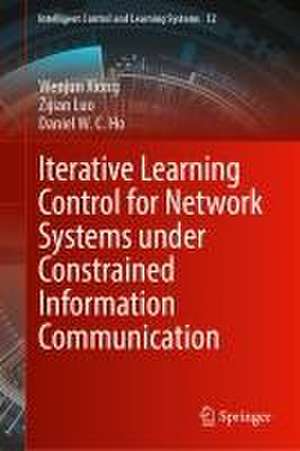Iterative Learning Control for Network Systems Under Constrained Information Communication: Intelligent Control and Learning Systems, cartea 12
Autor Wenjun Xiong, Zijian Luo, Daniel W. C. Hoen Limba Engleză Hardback – 27 mar 2024
This book focuses on the subject area of Network Systems and Control Theory, providing a comprehensive examination of the dynamic behavior of networked systems operating under communication constraints. It introduces innovative iterative learning control strategies that aim to ensure stability, consistency, and security of networked systems. The field of networked systems has garnered significant interest from scientists and engineers across various disciplines, including information, electrical, transportation, life, social, and management sciences. This book consistently addresses a wide range of issues related to networked systems, emphasizing the critical impact of communication constraints on stability and security. It highlights the effectiveness and importance of iterative learning methods in tackling these challenges.
Suitable for both undergraduate and graduate students interested in networked systems and iterative learning control, this book alsoserves as a valuable resource for university faculty and engineers engaged in complex systems, control theory research, and real-world applications. Its broad appeal extends to professionals working in related fields, seeking a deeper understanding of networked systems and their control mechanisms.
Preț: 893.21 lei
Preț vechi: 1089.29 lei
-18% Nou
Puncte Express: 1340
Preț estimativ în valută:
170.94€ • 177.80$ • 141.12£
170.94€ • 177.80$ • 141.12£
Carte tipărită la comandă
Livrare economică 14-28 aprilie
Preluare comenzi: 021 569.72.76
Specificații
ISBN-13: 9789819709250
ISBN-10: 9819709253
Ilustrații: XI, 223 p. 53 illus., 52 illus. in color.
Dimensiuni: 155 x 235 mm
Greutate: 0.51 kg
Ediția:2024
Editura: Springer Nature Singapore
Colecția Springer
Seria Intelligent Control and Learning Systems
Locul publicării:Singapore, Singapore
ISBN-10: 9819709253
Ilustrații: XI, 223 p. 53 illus., 52 illus. in color.
Dimensiuni: 155 x 235 mm
Greutate: 0.51 kg
Ediția:2024
Editura: Springer Nature Singapore
Colecția Springer
Seria Intelligent Control and Learning Systems
Locul publicării:Singapore, Singapore
Cuprins
Introduction.- Consensus under Event-Triggered Transmission and Quantization.- Consensus under Limited Information Communication.- Consensus under Switching Topology and Observer Information.- Tracking under Measurable and Unmeasurable State Information.- Tracking under Saturated Finite Interval and HNN-Structural Output.- Tracking Based on Discontinuous Learning Control Strategy.- Finite-iteration Learning Tracking with Packet Losses.- Finite-Iteration Learning Tracking with FlexRay Communication Protocol.- Multi-layered Sampled-data Tracking under Cooperative-Antagonistic Interactions.- Stability of Multilayer Supply Chain Networks with Constraints.- Security of Network Systems under Cyber-Attack
Notă biografică
Prof. Wenjun Xiong received the M.Sc. degree in applied mathematics from the Department of Mathematics, Southeast University, Nanjing, China, in 2005 and the Ph.D. degree in applied mathematics from the Department of Mathematics, City University of Hong Kong, China, in 2010. She is Professor at the School of Computing and Artificial Intelligence, Southwestern University of Finance and Economics, Chengdu, China. Her research interests include iterative learning control, complex networks, nonlinear dynamics and control, and cooperative control of autonomous systems.
Dr. Zijian Luo received his B.S. and M.Sc. degrees from Guizhou University in 2013 and 2017, respectively. And he will receive the Ph.D. degree in the School of Computing and Artificial Intelligence, Southwestern University of Finance and Economics, Chengdu, China, in 2023. His current research interests include iterative learning control, complex networks, differential equations, and distributed control.
Prof. Daniel W. C. Ho received B.S., M.S., and Ph.D. degrees in mathematics from the University of Salford, Greater Manchester, UK, in 1980, 1982, and 1986, respectively. From 1985 to 1988, he was Research Fellow with the Industrial Control Unit, University of Strathclyde, Glasgow, UK. In 1989, he joined the City University of Hong Kong, where he is currently Chair Professor of Applied Mathematics and Associate Dean of the College of Science. He has over 270 publications in scientific journals. His research interests include control and estimation theory, complex dynamical distributed networks, multiagent systems, and stochastic systems.
Textul de pe ultima copertă
This book focuses on the subject area of Network Systems and Control Theory, providing a comprehensive examination of the dynamic behavior of networked systems operating under communication constraints. It introduces innovative iterative learning control strategies that aim to ensure stability, consistency, and security of networked systems. The field of networked systems has garnered significant interest from scientists and engineers across various disciplines, including information, electrical, transportation, life, social, and management sciences. This book consistently addresses a wide range of issues related to networked systems, emphasizing the critical impact of communication constraints on stability and security. It highlights the effectiveness and importance of iterative learning methods in tackling these challenges.
Suitable for both undergraduate and graduate students interested in networked systems and iterative learning control, this book also serves as a valuable resource for university faculty and engineers engaged in complex systems, control theory research, and real-world applications. Its broad appeal extends to professionals working in related fields, seeking a deeper understanding of networked systems and their control mechanisms.
Caracteristici
Integrates network structure and learning control expertise to develop innovative iterative learning strategies Considers network communication constraints and use ILC techniques to achieve system stability and consensus Enhances network system security under communication constraints to resist risks effectively










